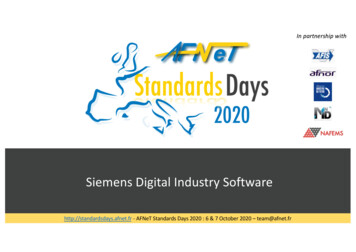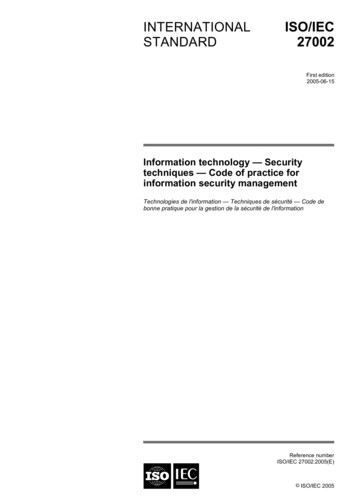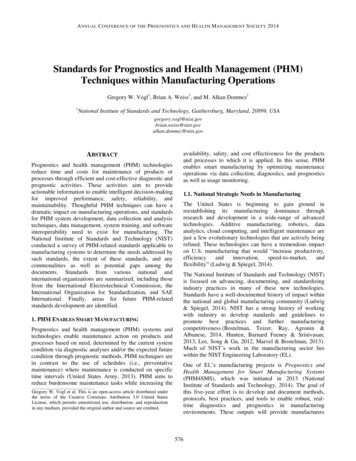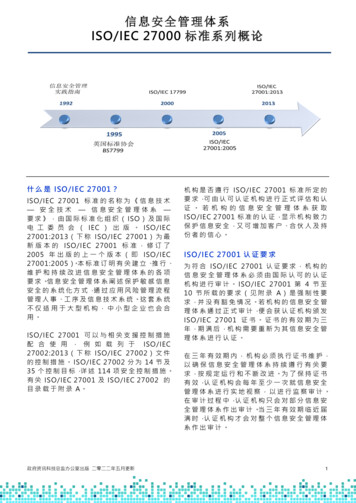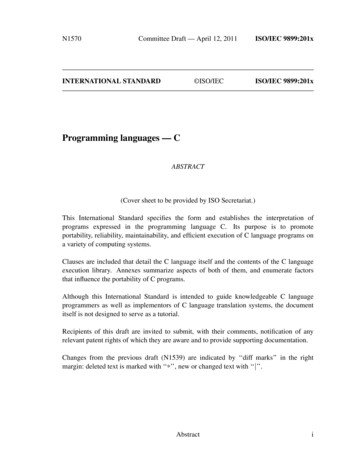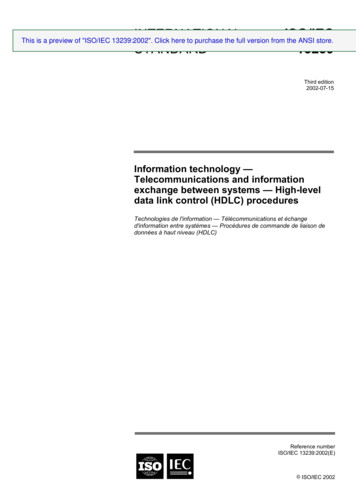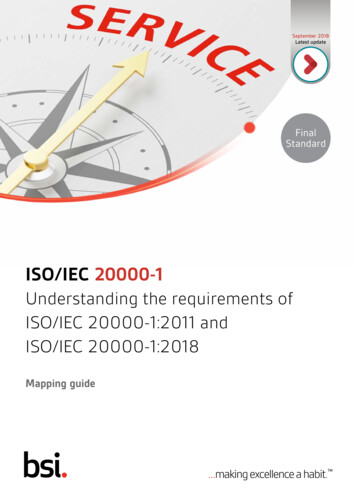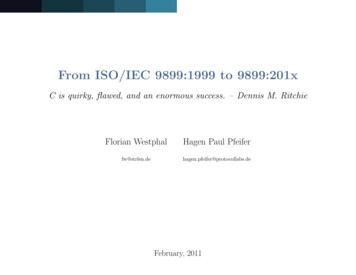
Transcription
From ISO/IEC 9899:1999 to 9899:201xC is quirky, flawed, and an enormous success. – Dennis M. RitchieFlorian WestphalHagen Paul bruary, 2011
Introduction- WG14 Charter Principles (none are absolute):- Existing code is important, existing implementations are not- C code can be portable – C code can be non-portable- Avoid “quiet changes”- Keep the spirit of C- Trust the programmer- Don’t prevent the programmer from doing what needs to be done- Keep the language small and simple.- Provide only one way to do an operation- Make it fast, even if it is not guaranteed to be portable- Make support for safety and security demonstrable- Support international programming (additional principle for C9X)From ISO/IEC 9899:1999 to 9899:201x2 30
- Minimize incompatibilities with C (additional principle for C9X)- Trust the programmer is outdated (additional principle for C1X, programmers needthe ability to check their work)From ISO/IEC 9899:1999 to 9899:201x3 30
Introduction- JTC1/SC22 is the international standardization subcommittee for programminglanguages- WG14 – C- WG9 – Ada- WG21 – C - WG23 – Programming Language Vulnerabilities- .From ISO/IEC 9899:1999 to 9899:201x4 30
Introduction C99 - Determining the Type of aLiteral Constant- C99- Decimal constant (no suffix): int, long int, long long int- Decimal constant (l or L suffix): long int, long long int- But: to be upward compatible with C89 and C the list should be:- int, long int, unsigned long int, long long int-long int, unsigned long int, long long int- . . . but it isn’t!- Consequence (arch: i386-pc-linux-gnu (32 bit)):- In C99 4000000000 fits into long long- In C89 4000000000 fits into unsigned long- Result: C99 and C89 are not compatible- (4000000000 -1) ? " - C99" : " - C89"From ISO/IEC 9899:1999 to 9899:201x5 30
Introduction C99 - Comments in C89 / C99- C99 added support for C -Style Comments (”//”)- . . . alters program behaviour:printf("%d\n", 1 //* */ 2);From ISO/IEC 9899:1999 to 9899:201x6 30
Run Time Assertions- assert(3) is run-time checked- #include assert.h ; void assert(scalar expression);- Implemented as a macro:- Statement with side-effects are triggered with NDEBUG- Never use assert() with side-effect statements- But: some expression can be checked at compile time - no need for run-time overhead!- if ((sizeof(struct foo) % 23) ! 0) die("foo size error");From ISO/IEC 9899:1999 to 9899:201x7 30
Compile Time Assertions- Linux Kernel:- BUILD BUG ON(sizeof(struct foo) % 23));- #define BUILD BUG ON(condition) ((void)sizeof(char[1 2*!!(condition)]))- char[1] or char[-1]- sizeof() is there to actually declare no array- The cast prevents the compiler from generating an warning message- Another idea (Miguel Sofer):- #define ct assert(e) {enum { ct assert value 1/(!!(e)) };}- C :- static assert(constant-expression, "error message");- Static assert ( constant-expression , string-literal ) ;From ISO/IEC 9899:1999 to 9899:201x8 30
Path of no Return- Especially for libraries: longjump, raise, abort, fatal(), die(), abort(), . . .- makes faster code, because the compiler can optimize more aggrisavly and produce lessmachine code- static analysis tool can provide more usefull feedback (if code path after a Noreturnis there, a Noreturn declared function returns a value)void f (void) {FILE *f;f fopen( file, .);if (f NULL) {handle error( . );}/* work with f */}Noreturn void f () {abort(); /* ok */}- handle error() - a analysis tool cannot make sure if handle error return or not. Ifdeclared as Noreturn then it is a lot simpler. And not: handle error may be linkedFrom ISO/IEC 9899:1999 to 9899:201x9 30
in, there is probably no source code available for the analysis tool.- If a function is called where the function was previously declared with the noreturnattribute and the function returns anyway the behavior is undefined- 453.htmFrom ISO/IEC 9899:1999 to 9899:201x10 30
Exclusive Access- Till C99 no exclusive access fopen()- Open must fail if a file already existFILE *fp fopen("foo.txt","r");if( !fp ) {/* file does not exist */fp fopen("foo.txt","w");.fclose(fp);} else {/* file exists */fclose(fp);}- Race Condition between both fopen calls!- Open Group Base Specification: O CREAT and O EXCL- open("foo.txt", O CREAT O EXCL) fails if file already exists- C1X: add X flag: wx (create text file for writing with exclusive access)From ISO/IEC 9899:1999 to 9899:201x11 30
Transparent Struct and Union- structpacket {struct {int proto; /* AF INET or AF INET6 */union {unsigned int addr v4;unsigned char addr v6[16];};} header;char *data;size t data len;}struct packet pkt { .header { .proto AF INET, .addr v4 INADDR ANY },.data NULL, data len 0 };From ISO/IEC 9899:1999 to 9899:201x12 30
C1x specifcation outline- some of the new functionality is optional ”conditional feature macros”, e.g.:STDC ANALYZABLE : annex L conformanceSTDC IEC 559 : Floating point arithmetic handling in annex F- Thread support is also optional ( STDC NO THREADS )From ISO/IEC 9899:1999 to 9899:201x13 30
Generic Selection- New keyword: Generic- Selects assignment expressions based on type names#define cbrt(X) Generic((X)), long: cbrtl, default cbrt ) (X)expands to cbrtl(X) if X is of type long and cbrt(X) otherwise.From ISO/IEC 9899:1999 to 9899:201x14 30
Thread support- #include threads.h - Nobody would use C’s threads if they were wildly different to POSIX threads, whichare already widely used, documented and understood- Similar to pthreads: mutexes, condition variables, . . .- phtread mutex init mtx init, . . .- Several pthread features unsupported, e.g. pthread setschedprio- Unlike pthreads, c1x contains functions for atomic operations and memory ordering- Thread local storage-class specifier: Thread local int myvar;From ISO/IEC 9899:1999 to 9899:201x15 30
Atomic Ops- #include stdatomic.h - New type qualifier: Atomic: Atomic int foo; stdatomic.h- Defines Types, Macros and Functions:- Atomic Types: atomic char, atomic short, atomic int, .- Operations on atomic types (init, compare, add, sub, . . . )- enum memory order: synchronize memory accesses- Fences ” to order loads/stores”From ISO/IEC 9899:1999 to 9899:201x16 30
Atomicity- i is not an atomic operation- Value has to be fetched, modified, and written back to memory- For single-threaded applications this is not relevant (exception: signal handler)- . . . but when concurrent access to i is possible, this is no longer true- c1x makes it possible to perform such modifications in a single operationFrom ISO/IEC 9899:1999 to 9899:201x17 30
Atomic Functions- atomic {load,store,exchange}: assignments, swap values, . . .- atomic fetch {add,sub,or,xor,and}: modify atomic type, returns new value- atomic compare exchange : atomic conditional swap, i.e. if (a b) a c;The result of the comparison is returned.- fences: synchronization operation without a memory locationFrom ISO/IEC 9899:1999 to 9899:201x18 30
Orderingvoid foo(void) {int a, b;[.]a 42;b 23;[.]The compiler or the CPU is free to re-order the assignments; there are no side-effects.From ISO/IEC 9899:1999 to 9899:201x19 30
Ordering- 2nd example. Lets consider adding an element to a linked list.1. The element is initialized (setting - next to NULL, etc)2. The element is assigned: tail- next elem- Q: Could the compiler re-order this?- Q: Could the CPU re-order this?From ISO/IEC 9899:1999 to 9899:201x20 30
Memory Ordering- Several of the atomic functions are so-call ”synchronization operations”.- Necessary to make changes to memory locations in one thread visible to others in areliable fashion.- Several stdatomic.h functions also have a corresponding explicit version, e.g.atomic load( Atomic *a) atomic load explicit( Atomic *a, memory order m)- version without explictit has memory order seq cst semantics- memory order: enum that defines memory ordering constraints:- memory order relaxed: no ordering- memory order acquire,release: load/store (read/write)- memory order seq cst: ”Sequential Consistency”: single total order for allaccesses to all variables.From ISO/IEC 9899:1999 to 9899:201x21 30
Fences (barriers)void atomic thread fence(memory order m)void atomic signal fence(memory order m)- Compiler Optimizations & load/store reordering are inhibited- thread fence also emits HW fence instructions, signal fence does not- depending on memory order, affects loads, stores or bothFrom ISO/IEC 9899:1999 to 9899:201x22 30
Alignment- gcc:- attribute ((aligned( )))- posix memalign()- since glibc 2.1.91- C1X: #include stdalign.h - New keywords: Alignas, alignof- New macros:- alignof: returns the alignment requirements of the operand type- alignas: is used to force stricter alignment requirements- New function: aligned alloc()From ISO/IEC 9899:1999 to 9899:201x23 30
Bounds Checking Interfaces- C1X Draft Annex K- libc run-time constraint checks- set constraint handler s()- abort handler s, ignore handler s- New functions with s suffix:fopen s, fprintf s, strcpy s, strcat s, gets s, .From ISO/IEC 9899:1999 to 9899:201x24 30
Unicode Support- In the past- All characters were the same size- 8 bit (7 bit)- string.h provides utilities function (english)- UNICODE- C1X adds new datatypes- char16 t (UTF-16)- char32 t (UTF-32)- (C 0x compatible)- String Literals- u""- U""From ISO/IEC 9899:1999 to 9899:201x25 30
Complex Numbers- C99 – “Complex types were added to C as part of the effort to make C suitable andattractive for general numerical programming.” (Rationale for International Standard –Programming Languages C)- float Complex- double Complex- long double Complex- Macros to create/modifiy complex numbers- #include complex.h - int i 3.5;- double complex c 5 3 * I; (Macro I expands to Imaginary I orComplex I)- Conditional feature:- STDC NO COMPLEX implementation does not support complex typesFrom ISO/IEC 9899:1999 to 9899:201x26 30
- Alignment requirement as an array containing exactly two elements of correspondingreal type ({float, double, long double} [2])- Operation of double Complex and float yield to double Complex- Trigonometric Functions- double complex cacos(double complex z);- long double complex cacosl(long double complex z);- long double complex cpowl(long double complex x, long double complex y);- double creal(double complex z);- Section: 7.3 Complex arithmeticFrom ISO/IEC 9899:1999 to 9899:201x27 30
Quick Exit- 7.22.4.7- Synopsis:#include stdlib.h Noreturn void quick exit(int status);- causes normal program termination to occur- functions registered by the atexit function are not called- signal handlers registered by the signal function are not called- longjmp() results in undefined behavior- glibc 2.10 (2009-03-08 Ulrich Drepper):- stdlib/quick exit.c- stdlib/at quick exit.cFrom ISO/IEC 9899:1999 to 9899:201x28 30
Questions?From ISO/IEC 9899:1999 to 9899:201x29 30
Overflows- abs(x) 0 is not always true!- abs(INT MIN) -2147483648- If fstrict-overflow is enabled an expression like abs(x) 0 can be simplified toa constant expression - be aware!- The compiler will assume that when doing arithmetic with signed numbers overflowwill not happen- Since GCC 4.2 this option is on by default with -O2, -O3 and -Os- Wstrict-overflow 2 to warn about simplificationsFrom ISO/IEC 9899:1999 to 9899:201x30 30
From ISO/IEC 9899:1999 to 9899:201x C is quirky, awed, and an enormous success. { Dennis M. Ritchie Florian Westphal Hagen Paul Pfeifer fw@strlen.de hagen.pfeifer@protocollabs.de

